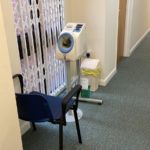Blood Pressure
High blood pressure does not usually have any symptoms, so the only way to find out if you have it is to get your blood pressure checked. Healthy adults aged over 40 should have their blood pressure checked at least once every 5 years. If you’re at an increased risk of high blood pressure, you should have your blood pressure checked more often, ideally once a year.
Having this done is easy and could save your life.
 There is a machine in the corridor which is available for patient use. Please hand in your readings to reception so that they can be added to notes.
There is a machine in the corridor which is available for patient use. Please hand in your readings to reception so that they can be added to notes.
Home blood pressure testing
Blood pressure tests can also be carried out effectively at home using your own blood pressure monitor. We encourage patients to have a BP kit available in their homes as it can also allow you to monitor your condition more easily in the long term. You can buy a variety of low-cost monitors so you can test your blood pressure at home or while you’re out and about. Alternatively, we have a small number of BP monitors we can loan out to patients. Reception will take a refundable deposit at time of issuing the machine which will be refunded upon return of the machine.
Measure your blood pressure twice a day, ideally in the morning and the evening, while you’re sitting down. Each time take 2 readings, 1 minute apart. Continue to measure your blood pressure twice a day for 7 days. Your doctor or nurse will use this information to work out your average blood pressure. It’s important to make sure you use equipment that’s been properly tested.
The British Hypertension Society (BHS) has information about validated blood pressure monitors that are available to buy.
Electrocardiogram (ECGs)
An electrocardiogram (ECG) is a simple test that can be used to check your heart’s rhythm and electrical activity. Sensors attached to the skin are used to detect the electrical signals produced by your heart each time it beats. These signals are recorded by a machine and are looked at by a doctor to see if they’re unusual.
An ECG may be requested by a heart specialist (cardiologist) or any doctor who thinks you might have a problem with your heart, including your GP. ECG’s are to be booked via reception after a request from the Doctor or other clinician.

